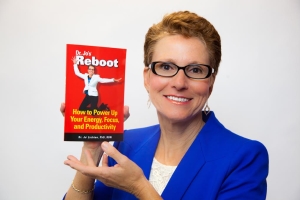Train Loco Nation! How we doing? Today we have an awesome interview with Dr. Jo Lichten. We had the great privilege of being moderators at the 2014 ISSN conference in Clearwater, FL for Dr. Jo’s lecture. We found it really interesting when she was talking about sleep. We wanted to get some myths dispelled on sleep and get you the real information from a true sleep expert and to have you all more energized throughout the day with some practical applications on how to get more sleep. So without further ado, lets get to know Dr. Jo!
– Chris and Eric
_____________________________________________________________________________________________________________________________
DDT: Could you give us a little background info on who Jo Lichten is?
Dr. Jo: I’m a PhD nutritionist, registered dietitian, and speaker who inspires busy people to stay healthy, sane, and productive.
DDT: What got you started or inspired to get into the health and fitness lifestyle?
Dr. Jo: At the age of 16 I developed an eating disorder – so I majored in college to help myself. It wasn’t until after my recovery that I realized that I could help others too!
DDT: We have heard that what counts is the amount of REM sleep one gets, not the amount of hours. Can you tell us a little more about what REM sleep is and why it’s important?
Dr. Jo: Our body runs through 90-minute cycles of alertness during the day – and 90-minute cycles of different levels of sleep during the night. Each 90-minute sleep cycle starts in a light state of sleep, goes into a progressively deeper state of sleep, and then ends in REM. REM is a state of rapid eye movement, where most dreams occur. Then the cycle repeats again. You’ll experience more deep sleep early in the night and more REM later in the night. Deep sleep is important for mental processing and regeneration of the body. REM sleep is more important for emotional health. So, both are important.
DDT: Is 7-9 hours of sleep required for everybody or can some people really function on 4-5 hours and not have any negative effects on health and hormones?
Dr. Jo: I’d say 7-8 is more normal, but that some require more and some require less. To evaluate if you’re getting enough sleep you should wake up without an alarm feeling relatively refreshed. And, if you were to lie down mid-afternoon in a quiet environment you shouldn’t immediately fall asleep. Falling asleep in 5 minutes is considered pathologically sleep-deprived.
DDT: We hear a lot of people say they feel more energized the next day if they slept for 6-7 hours a night, compared to 8-10 hours. Why is it that they feel more tired and sluggish if they ended up sleeping more?
Dr. Jo: Again, everyone is different as far as how much sleep they need. While some people may actually need 9 hours of sleep, others sleep that much because they are depressed. The key to feeling more refreshed is to wake up after REM sleep – at the end of the sleep cycle. So, that’s about 6 hours, 7.5 hours, etc. (based on full completion of 90-minute sleep cycles).
DDT: One of the most fascinating topics you discussed during your sleep lecture at the ISSN Conference was about circadian rhythms and sleep. Can you tell us more about this?
Dr. Jo: Because we live on a planet that makes one complete rotation on its axis every 24 hours, it’s easy to assume that we’re conveniently adapted to this schedule by waking up during the day and sleeping at night. But, that’s not true.
Even when kept in a windowless environment without any cues, our body keeps to a nearly 24 hour cycle. Nearly is the key word. On average we’re about 12 minutes more than 24 hours. That means if we naturally fall asleep at 11pm, the next night we won’t get sleepy until 11:12! We use light to help regulate this, get us back into alignment. That’s why it’s critical to get some natural day light during the morning hours or during lunch – about 30 minutes or risk having a harder time getting to sleep.
Of course, some of us naturally have a rhythm that’s less than 24 hours, meaning that they have a hard time staying awake till their usual bedtime – they should get that natural daylight during the later afternoon time.
DDT: Do 10-30 minute power naps count towards actual sleep? Do you recommend taking them?
Dr. Jo: No, they don’t count towards sleep time. Every afternoon, around 1-3pm, each of us experiences a “low” in their energy levels. It’s manageable or maybe not even noticed if you’ve had a good night’s sleep. But, those that are sleep-deprived experience this low very clearly.
That’s where naps can help to REBOOT the brain and body. Some people take naps naturally. Others need to train themselves. While I never set my alarm (because I would never naturally nap for a long time), but others need to (especially if they are sleep-deprived). It’s important not to sleep more than 30 minutes. I like 10-20 minute naps myself.
DDT: Does supplementing with melatonin really aid in better sleep? What does the research say about this?
Dr. Jo: No, the research really doesn’t support using melatonin, except with jet lag. Though some might feel a placebo effect, it really doesn’t help to get you to sleep significantly faster.
DDT: What are some take away tips for our readers on how to improve their quality of sleep?
Dr. Jo: Make sleep a priority. You eat healthy and you exercise, why not fit in proper levels of sleep? Adequate sleep helps us lose weight, maintain weight loss, minimize health risks (especially diabetes), and reduce risks of injury and accidents.
FUN TIME!
DDT: What does Dr. Jo like to do for fun?
Dr. Jo: I love to walk, run, swim, bike, surf, and ballroom dance. But, I especially like to tap dance! I’ve been taking classes most of my adult life – decades!
DDT: Your favorite dessert is?
Dr. Jo: That would be dark chocolate. Sometimes it’s brownies, currently it’s Dove dark chocolate pieces. I eat chocolate every day. I say, “a bit of chocolate every day prevents the death-by-chocolate experience.”
DDT: If you aren’t researching sleep, what other topics are you studying?
Dr. Jo: How food, movement and our thoughts affect our energy levels.
DDT: Where can our readers and supporters follow you and your work?
Dr. Jo: Excellent! Pick up a copy of REBOOT HERE
Visit my website – www.DrJo.com
Or follow me on social media!
www.Facebook.com/GoDrJo
www.Twitter.com/GoDrJo
www.LInkedin.com/in/GoDrJo
www.Pinterest.com/GoDrJo
www.YouTube.com/GoDrJo
DDT: Thanks for taking the time to let us interview you Jo!
Dr. Jo’s Bio:
Dr. Jo® inspires busy people to stay healthy, sane, and productive through her books, speaking engagements, and media appearances. As a motivational health speaker, Dr. Jo® has presented more than 1000 events in North America and abroad. She’s appeared on more than 300 radio and television shows including CNN, Fox & Friends, Daytime TV, and the Daily Buzz. Her quotes and articles have appeared in many publications including the Washington Post, USA Today, Chicago Tribune, Weight Watchers, and Prevention. Jo is the author of four books including her latest, Reboot – how to power up your energy, focus, and productivity. Dr. Jo® is a registered dietitian with more than 30 years of experience as a college professor, nutrition counselor, and industry consultant.
If you would like to receive more Interviews, informative articles, and educational videos from us, join our community
[gravityform id=”5″ name=”Train Loco Signup”]

